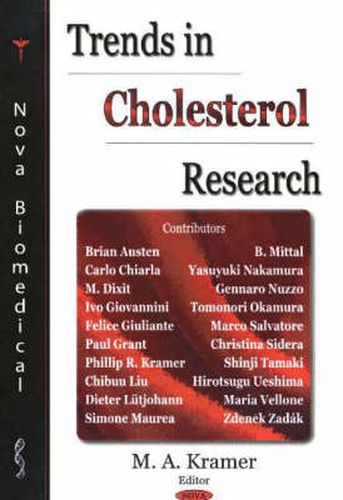Readings Newsletter
Become a Readings Member to make your shopping experience even easier.
Sign in or sign up for free!
You’re not far away from qualifying for FREE standard shipping within Australia
You’ve qualified for FREE standard shipping within Australia
The cart is loading…






Cholesterol is a soft, waxy substance found among the lipids (fats) in the bloodstream and in all the body’s cells. It’s an important part of a healthy body because it’s used to form cell membranes, some hormones and is needed for other functions. But a high level of cholesterol in the blood – hypercholesterolemia – is a major risk factor for coronary heart disease, which leads to heart attack. Cholesterol and other fats can’t dissolve in the blood. They have to be transported to and from the cells by special carriers called lipoproteins. There are several kinds, but the key ones are low-density lipoprotein (LDL) and high-density lipoprotein (HDL). Low-density lipoprotein is the major cholesterol carrier in the blood. If too much LDL cholesterol circulates in the blood, it can slowly build up in the walls of the arteries feeding the heart and brain. Together with other substances it can form plaque, a thick, hard deposit that can clog those arteries. This field is alive with exciting new research in all areas including frontal advances in the areas of managing cholesterol as well as cholesterol lowering drugs.
$9.00 standard shipping within Australia
FREE standard shipping within Australia for orders over $100.00
Express & International shipping calculated at checkout
Cholesterol is a soft, waxy substance found among the lipids (fats) in the bloodstream and in all the body’s cells. It’s an important part of a healthy body because it’s used to form cell membranes, some hormones and is needed for other functions. But a high level of cholesterol in the blood – hypercholesterolemia – is a major risk factor for coronary heart disease, which leads to heart attack. Cholesterol and other fats can’t dissolve in the blood. They have to be transported to and from the cells by special carriers called lipoproteins. There are several kinds, but the key ones are low-density lipoprotein (LDL) and high-density lipoprotein (HDL). Low-density lipoprotein is the major cholesterol carrier in the blood. If too much LDL cholesterol circulates in the blood, it can slowly build up in the walls of the arteries feeding the heart and brain. Together with other substances it can form plaque, a thick, hard deposit that can clog those arteries. This field is alive with exciting new research in all areas including frontal advances in the areas of managing cholesterol as well as cholesterol lowering drugs.